We are the Haggas family.
Parents: Mark and Sue, children: eight-year-old Meghan and eleven-year-old big brother Ryan. Pets: Edalynn the Beta Fish, Toothless the Leopard Gecko, and beloved family dog Nurse Treasure. This is our story of childhood cancer during the COVID-19 pandemic.
On February 11, 2020, our lives changed the day our five-year-old daughter Meghan was diagnosed with high-risk pre-B acute lymphoblastic leukemia (ALL).
The day after our son Ryan’s birthday in early February, Meghan developed a bad cold. We thought nothing of it until 10 days and a few nosebleeds later, the cold showed no signs of letting up. We took Meghan to a walk-in clinic, thinking it was tonsillitis. The doctor put her on some antibiotics, but she wasn’t getting any better.
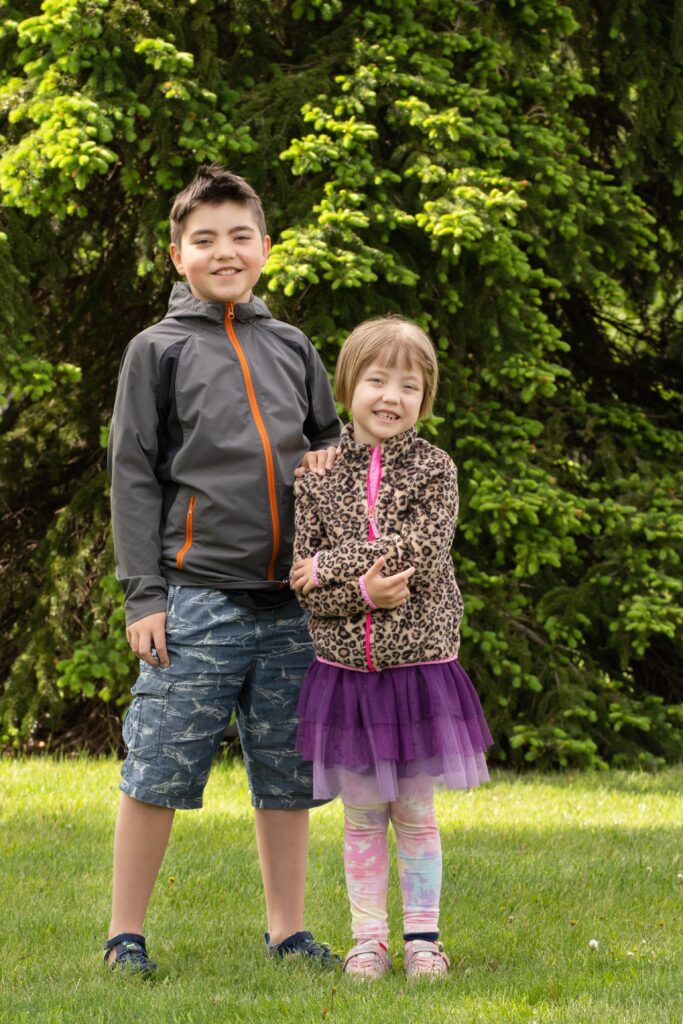
The morning of February 11, 2020, I was at home running my daycare business, with Meghan keeping me company. She was sad to have missed out on her kindergarten field trip to the Red Deer Hospital that day due to her cold. My husband had just dropped Ryan off at school. No sooner had he done that than I was calling to ask him to come home as Meghan was having another nosebleed. On the advice of HealthLink, my husband took Meghan to the emergency centre at the Red Deer Hospital. I contacted my day home family to inform them I was closing for the day and drove to the Red Deer Hospital to meet up with Mark. Meghan was sent for a chest X-ray and blood work. Mark left the hospital to pick up Ryan from school as we figured it would take a while to receive the test results. We would meet them at home probably with a prescription of antibiotics for Meghan.
I was alone in the hospital room of the ER ward with Meghan when the doctor came in. Closing the door behind him, he sat down across from us. He said the chest X-ray results were clear, but the blood work was abnormal. Then he immediately told me it was cancer, blood cancer, leukemia. The doctor calmly went on to say the oncology team in Calgary at the Alberta Children’s Hospital would further determine the details of the diagnosis, but there was no doubt, with the levels in her blood, that this was leukemia. I then heard the phrases…”life-threatening…blood transfusion to begin immediately along with cancer treatment.” The doctor told me I had time to call my husband to ask him to drop off an overnight bag for us. They had already arranged to have an ambulance take us to Calgary. The doctor opened the hospital room door and left.
I gave Meghan (or Muffin as we call her) a kiss on her head and told her I had to go into the hallway for a minute. I slowly closed the door, watching her scribble in a coloring book I’d packed that morning when she’d left with Mark for the hospital. The minute-to-minute business of the ER continued rushing around me as I collapsed to my knees, going over in my head what I was about to tell my husband.
When I called him, Mark was in the hallway of our children’s elementary school, chatting and laughing with the school’s admin, picking up Ryan after a fun full day of grade three. I then called my parents in Newfoundland who immediately booked a cross-Canada flight to be with us. I then went back to Meghan’s hospital room and sat with her.
What is anyone thinking at a moment like this? What goes through your mind when you think of a childhood cancer diagnosis? Do you think of years of watching your child suffer through painful procedures and possible gut-wrenching outcomes? Do you think of your support systems? Do you think of your other children and how it may affect them to see a sibling go through treatment? Do you wonder who will take care of them if you are at the hospital?
The oncology team at the Alberta Children’s Hospital gave us the heartbreaking news of Meghan’s diagnosis and a glimpse of the long road ahead. It would include two and half years of treatment for her high-risk leukemia.
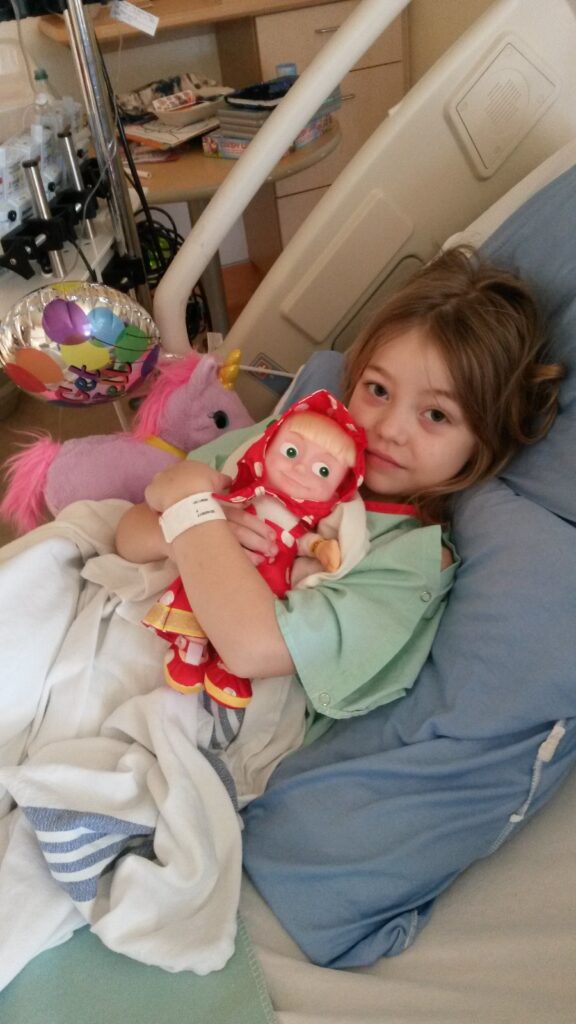
Our first 10 days in the oncology unit were emotionally difficult. The pediatric oncology social worker made a referral for a room at the Calgary Ronald McDonald House (RMH). She also gave us information about Kids Cancer Care and Fostership.
My husband and I took turns walking across the sidewalk to RMH for naps or a warm meal in the middle of the night, while the other parent slept beside Meghan in her hospital bed, holding her hand. My sister came from Yellowknife and stayed at a hotel in Calgary for those first three days. Visiting back and forth with Meghan, bringing her PJs and stuffies, making her laugh, as my sister and I stole glances of disbelief at the journey ahead for our family.
Our son Ryan went home to Red Deer. His grandparents took care of him, while we dealt with Meghan’s first hospital stay, first blood transfusions, first surgery (chest port implantation), and first IV and oral chemotherapies.
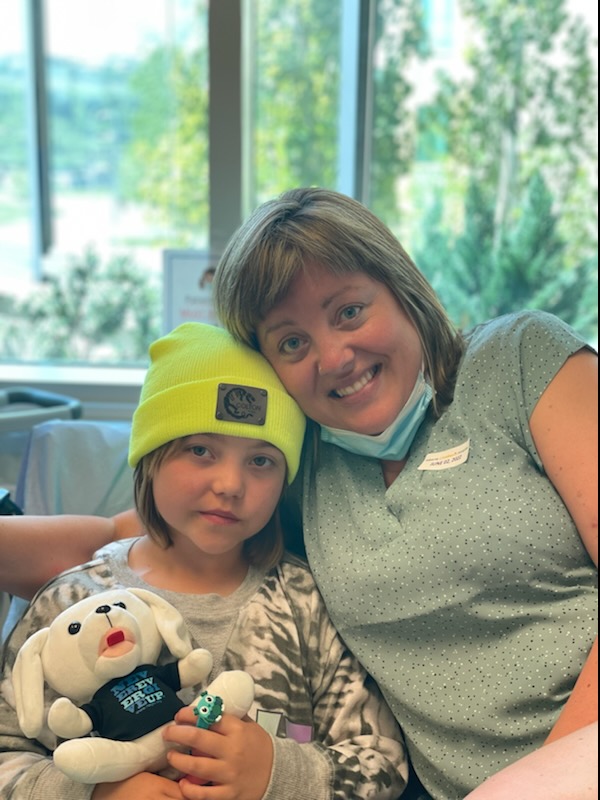
Five-year-old Meghan was scared.
For Meghan, the fear of never getting out of the hospital and never getting better was very real. She went from being a little five-year-old, enjoying her first few months of kindergarten, dancing in ballet concerts, and playing soccer with her buddies to being a pediatric cancer patient.
We learned from the oncology team that after 10 days our family would be discharged until our next visit. Being able to tell Meghan this news was amazing! We were staying at RMH for a few more days before heading home to Red Deer with her numerous daily medications. In those dark moments of fear, describing the RMH craft room, the big cozy beds, and the other children there, gave Meghan light, gave us hope. The playroom at RMH was open. We met other medical families and their littles in the dining room. During that first week at the Alberta Children’s Hospital, we met other families going through the initial diagnosis like us, families going through treatment and a parent’s worst nightmare, relapse.
We settled at home in Red Deer with our medical journals and numerous medications. We absorbed a ton of information that first week. The oncology team taught us how to keep a pediatric cancer patient safe from bacterial infections. This is necessary as the chemotherapy literally takes their immune system to zero. We ordered wall-mounted hand sanitizers for both the front and back entrances of our home. We kept Meghan home from school, and barred anyone who may have a cold from visiting our home. These were all logical steps in this new reality for our family.
Friends dropped off meals, Ryan went back to school and Meghan rested in bed with the family dog napping beside her. The dog was especially wonderful during at-home medication time. We would say meds and the dog would run to wherever Meghan was, so she could snuggle him while she took her numerous yucky-tasting oral chemotherapies. Meghan and Ryan video-chatted with their auntie and cousins up in Yellowknife and were excited for her to fly down again soon for a visit.

At home, we read through pamphlets from the oncology team and social worker. Mark and I soon learned about Camp Kindle, a summer camp where Ryan could meet siblings like him, and Meghan could make friendships with children like her. During weekly visits to the oncology out-patient clinic, we passed Kids Cancer Care posters of smiling bald-headed children at camp. “Well,” we thought, “thank goodness our kids will have this support system as they go through this nightmare.”
After a few weeks, we said goodbye to the grandparents and thanked them for their support. Big hugs as they left for the airport with a promise for them to hop on a plane at a moment’s notice should we need them. It was around this time that we received news that a child of one of the cancer families we connected with at Alberta Children’s Hospital had passed away. I visited in person with a few close friends, sharing coffees, tears, and laughter as the healing strength of a hug is so important when dealing with such unbelievable stress as a medical family.
I bet you can figure out what world event shook us and many other medical families next—the COVID-19 virus.
The COVID-19 virus and connecting with Kids Cancer Care resources.
We talked with Meghan about the back and chest pokes that were planned to occur once a week, then once a month. She was scared. She was tired of the process. It was hard. Five months into treatment, Meghan’s hair completely fell out. She told us no one looked like her. I contacted Kids Cancer Care and discovered some amazing staff working on innovative Zoom programs to encourage social connection between pediatric cancer families.
We connected with the PEER program through Zoom once a week. This allowed Meghan and her brother to talk to kids like them while playing fun online games and participating in Zoom-based exercise and physiotherapy sessions. Kids Cancer Care also offered weekly Zoom programs with craft activities. I signed up too and loved the Zoom aerobics classes with other Kids Cancer Care Moms!
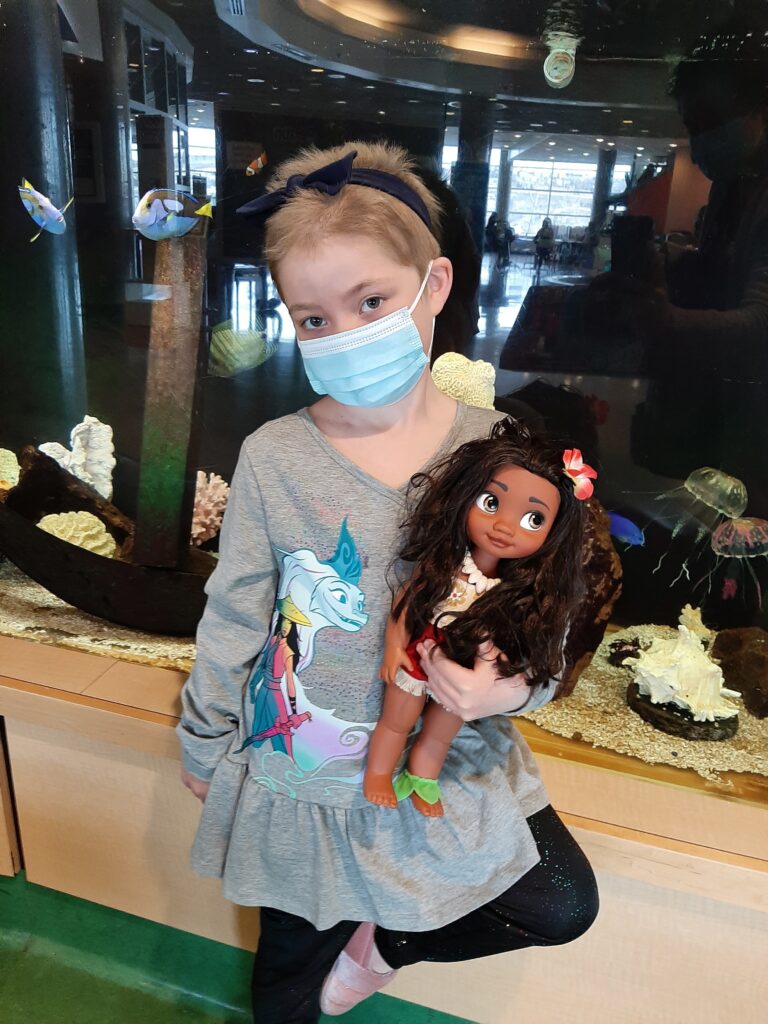
Why the emphasis on creative Zoom-based cancer support for families? You guessed it! The risk of COVID-19. Kids Cancer Care had moved programs online to support families, while protecting medically vulnerable children like our six-year-old medically fragile, immune-compromised little Leukemia Warrior Princess Meghan. That COVID-19 virus was now a global phenomenon.
- Schools closed
- Recreation centers closed
- Playgrounds were roped off with yellow police tape
- Family members could no longer fly in to visit
- For a time, my husband was the only member of the household allowed to go out in public to do grocery shopping
- Seeing friends in person to hug was too risky
- Common areas and playrooms at Ronald McDonald House closed
- Summer camp at Camp Kindle closed
- Siblings were no longer permitted in the out-patient clinic of the oncology ward at the hospital
- Only one parent at a time was permitted in the oncology out-patient unit of the Alberta Children’s Hospital
Long periods of time between 2020 and 2022 passed when the only other people my children saw were Kids Cancer Care children and staff on Zoom and Meghan’s oncology team. I stopped working those two and half years to take care of Meghan. We switched from online school after two months to begin homeschooling to better accommodate Meghan’s medical appointments and energy levels.
As much as other well-meaning bystanders or friends tried, we felt that Kids Cancer Care staff and families were the only people who could truly understand and relate to the journey we were on.
In August 2020, we had our first of three experiences as a family at Camp Kindle. Meghan was well enough to travel but she was feeling nauseated and crummy most of the time. Kids Cancer Care provided us, for free of charge, three-night accommodations at Camp Kindle and full use of the facilities. We took them up on their offer, packed our food, packed all of Meghan’s medications, and away we went! This place must be seen to be believed. The scenery is amazing, but the sheer amount of effort Kids Cancer Care staff and volunteers go through to give cancer families the opportunity to enjoy the great outdoors together while keeping in mind that pediatric cancer patients need access to cozy beds, bathrooms, and living rooms is fantastic! Often during our first stay, my husband and son would enjoy a cozy campfire outside while I read a book inside, watching over Meghan as she slept off the nauseating side effects of oral steroids and chemotherapy. Meghan would then wake up and sit outside on my lap listening to the nearby brook and the birds in the rustling trees.

Fast forward to August 2021. Seven-year-old Meghan had moved into the maintenance phase of treatment and was now receiving spinal and IV chemotherapies at the Alberta Children’s Hospital only once a month, as opposed to every weekend. She continued with her daily oral chemotherapies at home but had more good days than bad and her immune system was slowly growing stronger as the IV chemotherapy decreased. In discussion with our oncology team, we decided to return to in-person school for both of our children in September 2021.
Another wonderful program for Kids Cancer Care families is their Cancer in the Classroom presentation. Meghan had left school halfway through kindergarten and was now returning to grade two. How would we navigate this transition? Our family worked with Kids Cancer Care staff to develop a customized presentation, on which Megan took the lead. The presentation explained to her grade-two classmates why she had been away from school for so long, why she would still be missing school for medical appointments (Meghan was still on a 30-day cycle of IV chemotherapies, oral steroids and at-home chemotherapies) and anything else she wanted to share with the class.

This was a surreal moment!! My husband and I sat in the back of the grade-two classroom in the tiny chairs (our son Ryan was just down the hall in his grade-five class), colorful math and learning posters covering the walls of the room, as our seven-year-old girl sat in front of her peers and proudly told them all about her cancer journey. Ms. Kimberly Zoomed in from the Kids Cancer Care office in Calgary as Meghan walked the class through the presentation. Kids Cancer Care also gave Meghan a Monkey in My Chair stuffy, which the teacher would place in Meghan’s seat on the days she could not be there. What a fantastic way to promote empathy and compassion in classrooms for medical children.
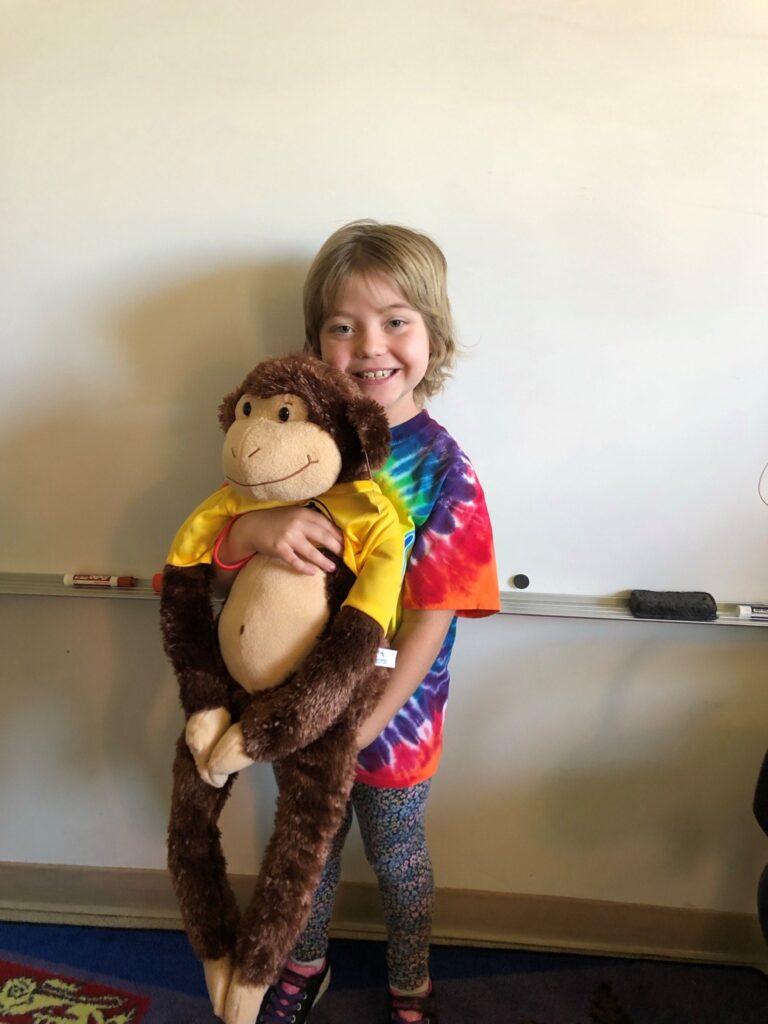
On Meghan’s two-year cancer diagnosis anniversary, her elementary school completed a social justice project and collected toy donations for Kids Cancer Care programs. Meghan and I were able to deliver this huge amount of gifts to Kids Cancer Care on our way to one of Meghan’s monthly IV chemo appointments at the hospital.
Eight-year-old Meghan completed her two and half years of active treatment on June 19, 2022. We were pleased that the surgery on June 20th to remove her chest port was a success as this allowed time for her to recover before attending her first Camp Kindle summer camp with her brother Ryan from July 4th to July 8th.
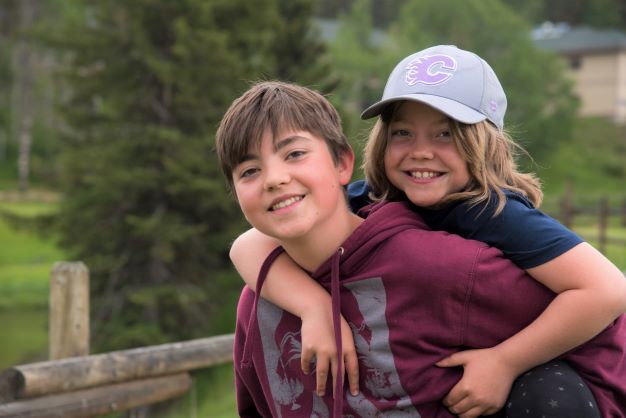
Our children were finally able to meet in person the other cancer children and siblings they had been Zooming with for the past two and half years!!
We take things one day at a time because sometimes the future possibilities can seem overwhelming. Having the Kids Cancer Care support network has helped us cope with the never-ending ups and downs of a childhood cancer diagnosis, active treatment, and long-term treatment.
Thank you, Kids Cancer Care.
Love,
Meghan and family
XOX




































